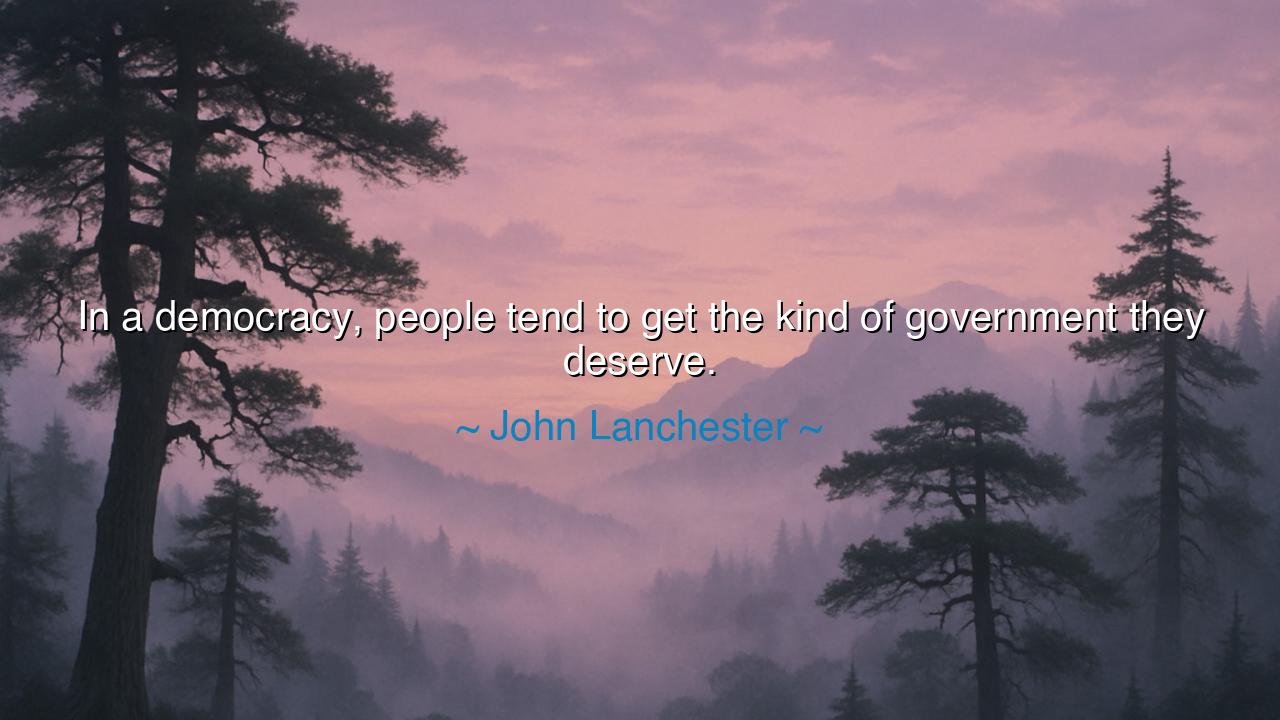
In a democracy, people tend to get the kind of government they






When John Lanchester wrote, “In a democracy, people tend to get the kind of government they deserve,” he was not casting judgment from on high — he was holding up a mirror to the soul of society itself. His words strike with the moral force of an ancient oracle: in a land where power is drawn from the consent of the governed, the character of the people shapes the character of their leaders. A democracy, Lanchester reminds us, is not merely a system of institutions — it is a reflection of collective will, wisdom, and weakness. When citizens grow ignorant, indifferent, or corrupt, their government follows suit. When they are vigilant, principled, and courageous, their government rises in kind. Thus, his warning is both simple and terrible: the health of democracy depends not on the rulers, but on the ruled.
The origin of this quote lies in Lanchester’s writings on politics, economics, and society — especially his reflections on how ordinary citizens participate, willingly or not, in the systems that govern them. A novelist and journalist, he often explored how financial and political power intertwine, and how the people’s choices — or their apathy — sustain that power. His words echo an older wisdom that has echoed through centuries. The philosopher Joseph de Maistre once said, “Every nation gets the government it deserves,” and even before him, thinkers from Plato to Cicero warned that the state mirrors the moral fiber of its people. Lanchester’s phrasing, however, pierces more deeply, for it acknowledges the paradox of democracy itself: that the people, who demand freedom, are also responsible for what freedom creates.
In the style of the ancients, we might imagine Lanchester speaking to a young republic at dawn, saying, “Your laws, your leaders, your destiny — these are not gifts bestowed from heaven, but the harvest of your own virtue.” For democracy, unlike monarchy or tyranny, cannot hide behind the excuse of divine right. It is a covenant between citizens and truth — a living trust that demands both liberty and labor. If the people neglect their duty to think, to question, to hold power accountable, then freedom becomes the seedbed of decay. The very strength that built the republic will become the weakness that unravels it, and the rulers who rise will not be tyrants imposed by force, but mirrors of the people’s neglect.
History offers countless examples of this principle in motion. In the final days of the Athenian democracy, the people who once produced philosophers like Socrates and statesmen like Pericles had grown weary of the burden of self-rule. They voted not for wisdom, but for flattery; not for justice, but for comfort. In their restlessness, they exiled their wisest teacher and handed power to demagogues who promised quick victories and easy answers. The result was not freedom, but ruin — Athens fell not by the sword of Sparta, but by the corruption of its own judgment. So it is in every age: when citizens trade conscience for convenience, when they stop asking what is right and begin asking only what is profitable, democracy rots from within.
And yet, Lanchester’s quote is not merely a condemnation — it is also a call to awakening. If the people get the government they deserve, then they also possess the power to deserve better. Every act of civic courage — every vote cast with thought, every truth spoken against deception, every refusal to bow before apathy — becomes a spark in the great fire of renewal. Democracy, after all, is not sustained by perfect leaders, but by responsible citizens. The burden of self-government is heavy, but it is also sacred. It demands participation, education, and above all, moral discipline — the willingness to look beyond one’s own comfort to the common good.
There is a quiet heroism in this truth. It means that the fate of nations does not rest in palaces or parliaments, but in the hearts of the people — in the conversations at their tables, in the integrity of their daily work, in the courage with which they face truth over illusion. When the people live with honor, they elevate those who lead them. When they live by deceit or indifference, they summon rulers of the same kind. A corrupt populace cannot produce a virtuous government, any more than a poisoned tree can bear sweet fruit. Thus, the destiny of democracy is written not in constitutions, but in conscience.
The lesson of John Lanchester’s words is both timeless and urgent: freedom is not a right to be claimed, but a responsibility to be upheld. Every citizen is a builder of the nation — with their vote, their voice, their virtue. Apathy is the slow death of democracy, while vigilance is its lifeblood. If the people wish for honest governance, let them first be honest. If they desire justice, let them first act justly. And if they wish for wise leaders, let them raise their children to value wisdom over wealth.
So let this teaching be remembered, as the ancients would inscribe it in stone: a nation is the reflection of its people. The government is their shadow — it rises, falls, and darkens according to their light. Let each generation tend that light, lest it dim into tyranny or fade into oblivion. For in the end, democracy is not a gift handed down from the powerful; it is the ongoing creation of the many — and every citizen, whether they know it or not, shapes the government they will one day deserve.






AAdministratorAdministrator
Welcome, honored guests. Please leave a comment, we will respond soon